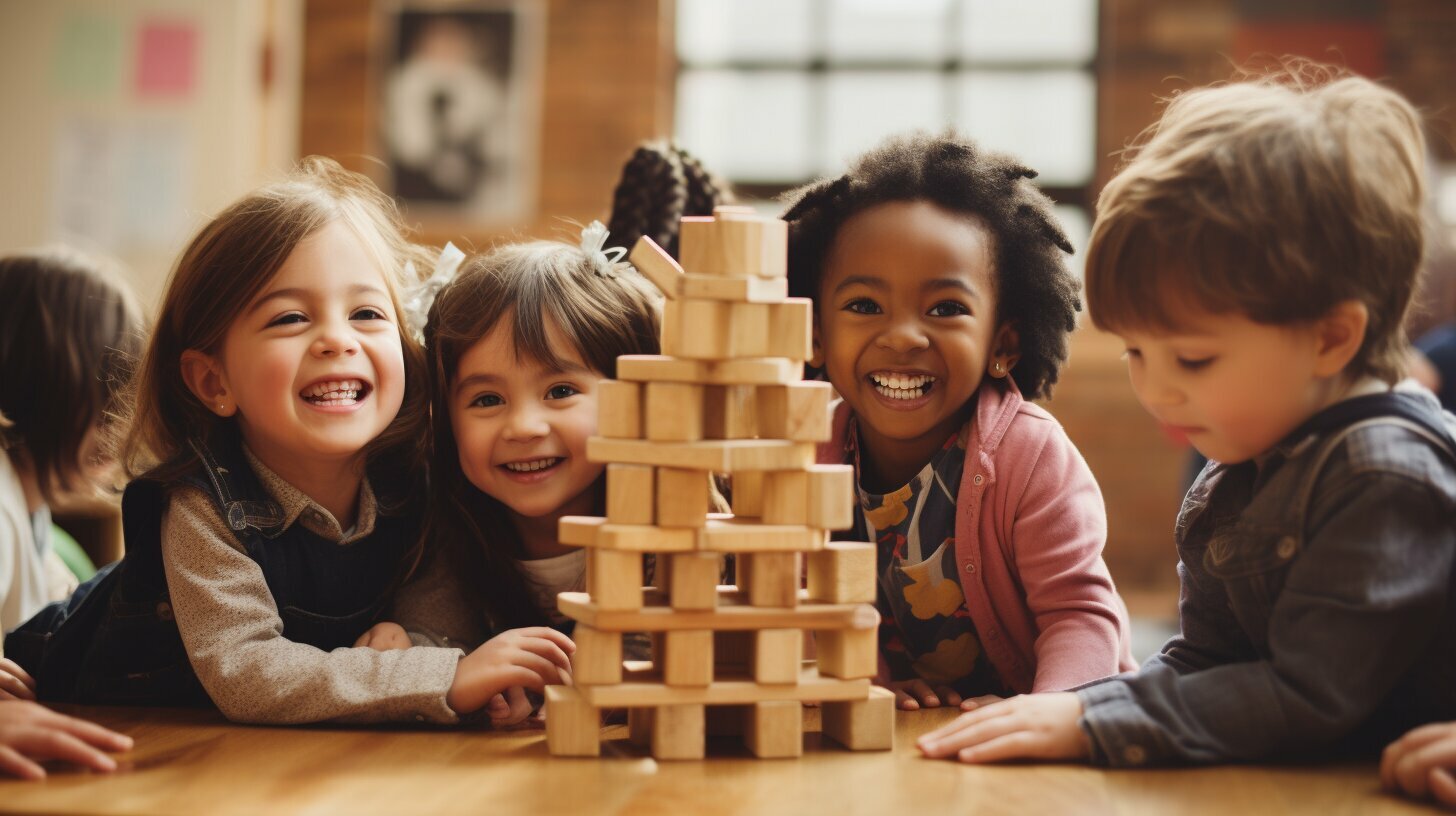As parents, we all want our children to be happy and well-adjusted, with strong social skills and the ability to handle life’s ups and downs with resilience and confidence. It’s important to remember that “child social coping” is a key component of overall child well-being. Developing social skills, resilience, confidence, and a positive self-image in children is crucial for their lifelong success and happiness.
Children who struggle with social coping may have difficulty making friends, managing conflict, and dealing with difficult emotions. Fortunately, there are many ways that parents and caregivers can support children in building these important skills.

- Understanding the Impact of Separation and Divorce on Children
- Building a Supportive Environment for Children
- Developing Effective Communication Skills
- Encouraging Healthy Relationships and Socialization
- Teaching Problem-Solving and Conflict Resolution
- Promoting Emotional Regulation and Resilience
- Encouraging Empathy and Understanding Others
- Promoting Self-Esteem and Positive Self-Image
- Nurturing a Growth Mindset
- Conclusion


Key Takeaways:
- Social coping is essential for a child’s overall well-being.
- Developing social skills, resilience, confidence, and a positive self-image are crucial for lifelong success and happiness.
- Children who struggle with social coping may have difficulty making friends, managing conflict, and dealing with difficult emotions.
- Parents and caregivers can support children in building these skills through various techniques.
- Encouraging healthy relationships, communication skills, problem-solving skills, empathy, and self-esteem are some of the ways to promote social coping in children.
Understanding the Impact of Separation and Divorce on Children
Children can experience a wide range of emotions when their parents separate or divorce. The emotional impact on children can be distressing and may result in changes in their social coping abilities. As parents, it is essential to understand and help children cope with the challenges of separation and divorce.
One of the significant challenges following separation and divorce is the disruption of routine and security. A stable and consistent environment is crucial for a child’s emotional wellbeing. Therefore, it is crucial to establish a routine and create a safe space for the child.
| Helping Children Cope with Separation and Divorce | Emotional Impact on Children | Challenges of Separation and Divorce |
|---|---|---|
| 1. Communicate with your child openly and honestly. | 1. Sadness, anger, anxiety, confusion, guilt, and frustration. | 1. Disruption of routine, changes in daily life, loss of security. |
| 2. Reassure your child that the separation or divorce is not their fault. | 2. Low self-esteem, feelings of rejection, and abandonment. | 2. Financial concerns, adjustment to new living arrangements and new family dynamics. |
| 3. Encourage your child to express their feelings and listen actively. | 3. Difficulty concentrating, emotional outbursts, nightmares and sleep problems. | 3. Conflict between parents, communication issues, and unresolved emotional issues. |
It is essential to create a supportive environment for children going through separation and divorce. Parents can provide emotional support, seek professional help, and ensure they maintain positive relationships with their child and their former partners.
Overall, helping children cope with separation and divorce can be challenging. However, with the right support, children can develop resilience and effective social coping skills that will benefit them throughout their lives.


Building a Supportive Environment for Children
Creating a supportive environment is crucial for enhancing children’s social coping skills. A positive and safe space can help children feel more secure and confident, allowing them to build stronger relationships and cope with challenges more effectively.
When creating a supportive environment for children, it’s important to:
- Provide a safe space: Children need to feel safe and secure in their environment. Ensure that the physical space is free from hazards and that children know they can express themselves without fear of judgment or harm.
- Foster positive relationships: Building positive relationships with children can help them feel cared for and valued. Take the time to connect with each child, listen to their thoughts and feelings, and show empathy. Encourage positive interactions between children, such as taking turns and sharing.
- Offer emotional support: Children need emotional support to develop healthy coping strategies. Teach them how to recognize and label their emotions and provide them with tools to manage stress and anxiety. Encourage open communication and active listening.
By creating a supportive environment, children can learn and practice positive social skills. They can develop self-confidence and self-awareness and learn how to navigate social situations in a healthy and productive way.


“Building a supportive environment is not only essential for children’s social coping but also for their overall wellbeing and development.”
Developing Effective Communication Skills
Effective communication skills are an essential component of social coping for children. By developing skills such as active listening, assertiveness, and empathy, children can better navigate social situations and build stronger relationships with their peers.
Active listening involves paying full attention to the speaker and demonstrating interest in what they’re saying. Encourage your child to make eye contact, ask questions, and summarize what they’ve heard to ensure they fully understand the message. This skill is particularly helpful in resolving conflicts and building trust.
Assertiveness is the ability to express one’s thoughts, feelings, and needs clearly and respectfully. Teach your child to use “I” statements, to make requests rather than demands, and to stand up for themselves when necessary. This skill reduces the risk of being bullied or taken advantage of and promotes healthy communication.
Empathy is the ability to understand and relate to the feelings and experiences of others. Discuss emotions with your child, encourage them to recognize others’ feelings, and ask them about their own. This skill is essential for building strong relationships, promoting kindness, and preventing bullying.


“Good communication is the bridge between confusion and clarity.”
-Nat Turner
Encouraging Healthy Relationships and Socialization
Healthy relationships and socialization are essential for children’s overall well-being and social coping skills. Positive peer interactions and the ability to work within a team can help children develop important skills such as communication, cooperation, and problem-solving.
Parents and educators can encourage healthy relationships and socialization by:
- Providing opportunities for children to interact with others in different settings, such as playdates, clubs, and extracurricular activities.
- Encouraging participation in group activities, such as sports teams or community events.
- Teaching conflict resolution skills to help children navigate difficult situations with their peers.
- Modeling positive social behavior and encouraging kindness and empathy towards others.
When children have healthy relationships and socialization skills, they are more likely to have a positive self-image and enjoy a sense of belonging. They are also better equipped to handle social challenges and cope with stress.
A study conducted by the National Institute for Health and Care Excellence found that social support and social connectedness were important factors in promoting and maintaining mental health in children and young people. The study highlighted the need for children to have access to a supportive environment that encourages positive social interactions.


“By encouraging healthy relationships and socialization skills, we are setting children up for success in many areas of their lives, both now and in the future.”
Peer Interactions
Peer interactions play a significant role in children’s social development. It is through peer interactions that children learn important social skills such as communication, negotiation, and cooperation. Parents and educators can support healthy peer interactions by:
- Providing opportunities for children to interact with peers in different contexts.
- Encouraging positive behaviors, such as sharing, taking turns, and listening to others.
- Teaching assertiveness skills to help children stand up for themselves while also respecting the needs and feelings of others.
When children have positive peer interactions, they are more likely to feel a sense of belonging and develop strong social skills that will serve them well throughout their lives.
Teaching Problem-Solving and Conflict Resolution
Teaching problem-solving and conflict-resolution skills to children is crucial in enhancing their social coping abilities. It helps them to manage social challenges and to deal with conflicts in a constructive manner.
| Techniques to Teach Problem-Solving and Conflict Resolution | Examples |
|---|---|
| Encourage children to express themselves. | “I feel upset when you take my toy without asking. Can you please ask me next time?” |
| Teach active listening. | “I understand that you are angry. Can you tell me more about why you feel that way?” |
| Practice assertiveness. | “I would prefer not to play that game. Let’s play something else.” |
| Encourage empathy and perspective-taking. | “I can see that you are upset. How can I help you feel better?” |
| Teach problem-solving steps. | Identify the problem, brainstorm solutions, choose the best solution, and evaluate the outcome. |
It is also important to guide children in coping with social challenges. Encourage them to seek help from trusted adults or friends when they are faced with social problems. Let them know that it is okay to ask for help and that doing so is a sign of strength.
Furthermore, parents and caregivers can model positive behavior by resolving conflicts with others in a calm and respectful manner. This will teach children how to manage conflicts in a healthy way and help them to build positive relationships.


Promoting Emotional Regulation and Resilience
Developing emotional regulation and resilience is essential for children’s social coping skills. By learning to manage stress and cope with emotions, children become better equipped to handle the challenges they may face in their interactions with others.
One effective technique for promoting emotional regulation is deep breathing exercises. When children are feeling overwhelmed, taking a few deep breaths can help them calm down and refocus. Additionally, creating a daily routine that includes physical activity, such as yoga or meditation, can help children manage stress and build resilience.
| Tip | Description |
|---|---|
| Teach problem-solving skills | Encourage children to brainstorm solutions to challenging situations. This can teach them to approach problems with a clear head and a positive attitude. |
| Encourage positive self-talk | Help children develop a positive inner voice by encouraging them to use affirmations and counter negative thoughts. |
| Teach coping strategies | Provide children with a range of coping strategies, such as taking a break, talking to a trusted adult, or engaging in a favorite activity. |
It’s also important to provide children with emotional support and allow them to express their feelings in a safe and supportive environment. Parents and caregivers can help children build resilience by modeling healthy coping skills themselves and encouraging children to take on new challenges.
By promoting emotional regulation and resilience, children can develop a greater sense of self-awareness and confidence, leading to stronger social coping skills in the long run.


Encouraging Empathy and Understanding Others
Empathy is a crucial skill for social coping, as it helps children understand and connect with others on a deeper level. By developing empathy skills, children can gain a better understanding of others’ perspectives and emotions, fostering kindness and compassion.
One effective way to encourage empathy in children is through perspective-taking activities. For instance, ask your child to imagine how they would feel if they were in someone else’s shoes, facing a similar situation. This approach can help children gain insight into the emotions and experiences of others, improving their ability to empathize.
Another effective method is to model empathetic behaviors and language. Children often learn by example, so parents must demonstrate empathy in their own actions and conversations. This includes being attentive listeners, acknowledging others’ feelings, and using kind and compassionate language.
| Ways to Encourage Empathy and Understanding Others | Examples |
|---|---|
| Model empathetic behaviors and language | “I can see that you’re feeling upset. Can you tell me more about why you’re feeling that way?” |
| Encourage perspective-taking activities | “How do you think your friend felt when you forgot their birthday?” |
| Promote acts of kindness | “Let’s make a card for Mrs. Smith, who just lost her pet.” |
Finally, parents can encourage empathy by promoting acts of kindness and generosity. This can include simple gestures like holding the door open for someone or sharing toys with a friend. By practicing kindness and compassion regularly, children can develop a stronger sense of empathy and increase their understanding of others.


In summary, empathy and understanding others are essential skills for social coping. By modeling empathetic behaviors, encouraging perspective-taking activities, and promoting acts of kindness, parents can help their children develop a stronger sense of empathy and connect with others on a deeper level.
Promoting Self-Esteem and Positive Self-Image
Building a positive self-image and self-esteem is crucial for children’s social coping. When children feel good about themselves, they are more confident and better equipped to handle social challenges. Encouraging a positive self-image and self-worth can help children develop lifelong confidence and resilience.
One way to promote self-esteem is through positive affirmations. Encourage children to repeat positive statements about themselves, such as “I am capable,” “I am worthy,” and “I am loved.” These affirmations can help children develop a positive self-image and self-worth.
Another way to promote self-esteem is through positive feedback. When children succeed, acknowledge their accomplishments and provide positive feedback. This can help build their confidence and encourage them to continue to strive for success.
It’s also important to provide children with opportunities to develop their strengths and interests. Whether it’s through sports, art, or music, children who are engaged in activities they enjoy are more likely to develop a positive self-image and a sense of accomplishment.
Finally, it’s important to encourage children to embrace their unique qualities. Help them understand that everyone is different and that diversity is a beautiful thing. By embracing their individuality, children can develop a strong sense of self-worth and self-confidence.
Examples of Activities to Promote Self-Esteem:
| Activity | Description |
|---|---|
| Self-Portrait | Encourage children to create a self-portrait that celebrates their unique qualities and strengths. |
| Compliment Box | Have children write down compliments for their peers and place them in a box. At the end of the day, have each child read the compliments they received. |
| Strengths Collage | Have children cut out pictures from magazines or draw pictures that represent their strengths and create a collage. |
Encouraging a positive self-image and self-worth is essential for children’s social coping. By promoting self-esteem, parents and caregivers can help children develop strong social skills and lifelong confidence.


Nurturing a Growth Mindset
Encouraging a growth mindset in children can help them approach challenges with confidence and resilience. When children believe that their intelligence and abilities can be developed through hard work and persistence, they are more likely to embrace challenges and learn from their failures.
To nurture a growth mindset, parents and educators can focus on the process of learning rather than just the outcome. This means praising effort and persistence, not just achievement. Additionally, it is important to encourage children to take risks and try new things, even if they might fail.
A growth mindset can also be developed through modeling. When children see adults embracing challenges and persisting through difficulties, they are more likely to believe that they can do the same.
It is important to note that nurturing a growth mindset does not mean ignoring the emotional challenges that come with failure. Instead, parents and educators can help children develop a resilience mindset by providing emotional support and encouraging reflection on what they can learn from their mistakes.
Embracing Challenges
Embracing challenges means encouraging children to take on tasks that challenge them, even if they might fail. This can help children develop a sense of confidence and independence, as well as a willingness to take risks.
Parents and educators can help children embrace challenges by providing opportunities for them to try new things and take risks. This can include trying new hobbies, taking on leadership roles, or even just trying a new food. It is important to provide support and encouragement throughout the process, even if the outcome is not successful.
Learning from Failures
Learning from failures is an essential component of developing a growth mindset. When children understand that failure is a natural part of the learning process, they are more likely to persevere through challenges and ultimately achieve success.
Parents and educators can help children learn from failures by encouraging reflection and self-evaluation. This can include asking open-ended questions, such as “What did you learn from this experience?” or “What would you do differently next time?” It is also important to provide emotional support and to help children identify their strengths and areas for improvement.
By nurturing a growth mindset in children, parents and educators can help them develop the resilience, confidence, and independence necessary for social coping and lifelong success.


Conclusion
In conclusion, social coping is a crucial skill for children to develop in order to achieve lifelong confidence and overall well-being. This is especially important in situations such as separation and divorce, where children may face additional challenges in their social coping abilities.
By building a supportive environment that encourages healthy relationships and socialization, teaching effective communication skills and problem-solving, promoting emotional regulation and resilience, encouraging empathy and understanding, and nurturing a growth mindset, children can develop the necessary skills to cope with social challenges and thrive.
It is essential that parents, caregivers, and educators prioritize and actively work towards enhancing children’s social coping abilities. By doing so, we can help children build the confidence and resilience they need to navigate any social situation they may encounter.
Let’s continue to invest in our children’s social coping skills and set them up for success in all aspects of their lives.



FAQ
What is social coping for children?
Social coping for children refers to their ability to effectively navigate social situations, develop healthy relationships, and manage their emotions and behaviors in social settings.
Why are children’s social skills important?
Children’s social skills are crucial for their overall wellbeing and success. These skills help them build positive relationships, communicate effectively, resolve conflicts, and navigate social challenges throughout their lives.
How can I help my child cope with separation and divorce?
Helping children cope with separation and divorce involves providing emotional support, maintaining routine and stability, fostering open communication, and encouraging expression of feelings. Seeking professional guidance and counseling can also be beneficial.
What are the challenges children face when dealing with separation and divorce?
Children dealing with separation and divorce may experience emotional distress, confusion, changes in routine, divided loyalties, and a sense of loss. They may also struggle with adjusting to new family dynamics and managing their own emotions during this challenging time.
How can I create a supportive environment for my child?
Creating a supportive environment for your child involves offering emotional support, providing a safe and nurturing space, fostering positive relationships, practicing active listening, and encouraging open communication.
What are some effective communication skills for children?
Effective communication skills for children include active listening, assertiveness, empathy, and clear expression of thoughts and feelings. These skills enable children to express themselves, understand others, and resolve conflicts peacefully.
How can I encourage healthy relationships and socialization in my child?
Encouraging healthy relationships and socialization in your child involves fostering positive peer interactions, promoting teamwork and cooperation, providing opportunities for social engagement, and teaching empathy and respect for others.
How can I teach my child problem-solving and conflict resolution?
Teaching problem-solving and conflict resolution to your child involves helping them identify the issue, brainstorming possible solutions, evaluating the pros and cons, and encouraging compromise and open communication. Role-playing and problem-solving scenarios can also be effective.
How can I promote emotional regulation and resilience in my child?
Promoting emotional regulation and resilience in your child can be done by teaching them coping strategies such as deep breathing and mindfulness, validating their emotions, encouraging positive self-talk, and modeling resilience in your own behavior.
How can I encourage empathy and understanding in my child?
Encouraging empathy and understanding in your child involves teaching them perspective-taking, exposing them to different cultures and experiences, promoting kindness and compassion, and modeling empathetic behavior in your interactions with others.
How can I promote self-esteem and a positive self-image in my child?
Promoting self-esteem and a positive self-image in your child involves providing genuine praise and encouragement, celebrating their achievements, helping them set realistic goals, teaching self-compassion, and fostering a supportive and accepting environment.
How can I nurture a growth mindset in my child?
Nurturing a growth mindset in your child involves praising effort and perseverance rather than focusing solely on outcomes, encouraging them to embrace challenges and learn from failures, promoting a love for learning, and reinforcing the belief that abilities can be developed through dedication and practice.





Leave a Reply